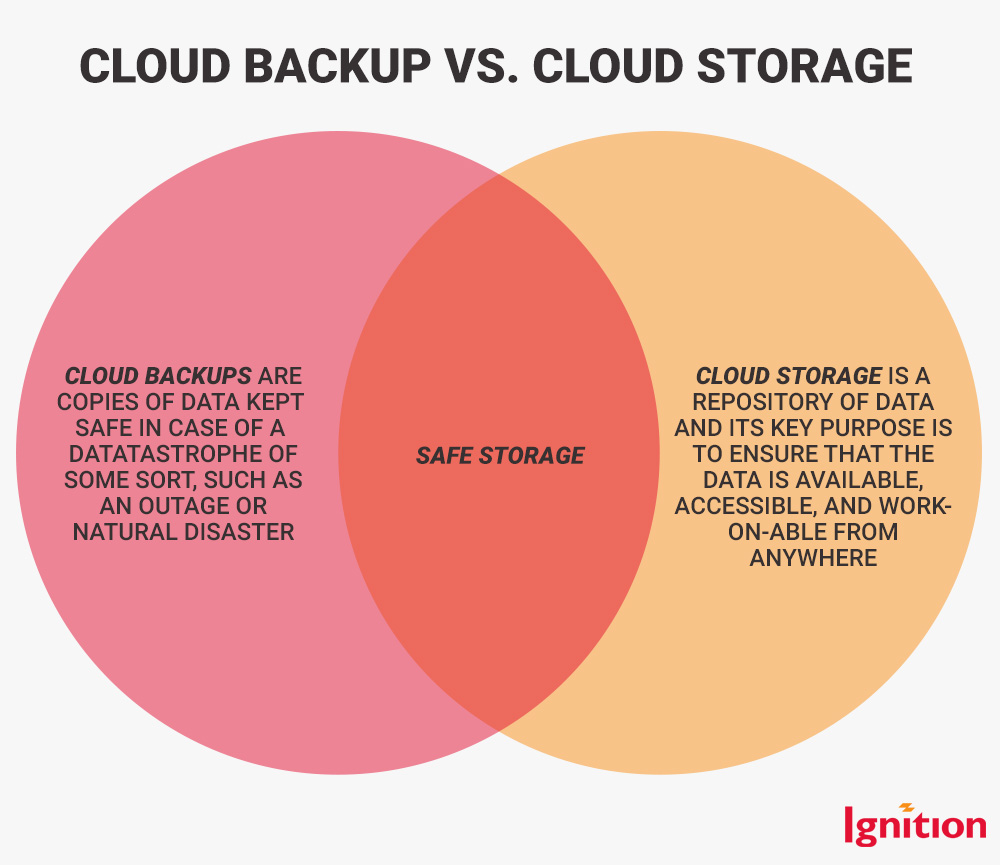Losing your data has no place in the betterment of society and that’s why we’re big fans of properly backing up your stuff. We won’t go into the benefits of backing up data because you should know this already, but, hmmm, can you hurl all your data into the Cloud – much like a DHL delivery driver throwing your new Mac over your fence – and be safe forever?
Nope.
Don’t give us the stink eye, because the Cloud is awesome for backups, but it’s good to understand cloud backup pros and cons. So, let’s get to it, as none of us have all day.
Are Cloud Storage and Cloud Backup the Same?
You know they ain’t. Yep, cloud backup is a kind of storage, but the purpose is very different from that of cloud storage.

Cloud Backup Options
Here are the three main ways you can use the Cloud to back up your darling data:
- Use a public cloud service such as Google Workspace or AWS. These are on-demand and all you need is internet access and $.
- Create your own private cloud: you’ll need expertise and a few more $$.
- Pay a managed service backup provider to take care of your backups using its own cloud architecture.
Now that we’ve sorted that out, let’s get on to the fun stuff.
The Pros and Cons of Cloud Backup
Sit back, pour yourself a soy latte with extra gubbins, and let’s begin.
| Pros | Cons |
| Easy transition | Costs more |
| Provides extra security | Lack of control |
| Great for remote work | Requires trusting your data in other’s hands |
| Scalable | Possibly a slow recovery time |
Pros
1: You Already Work in the Cloud
We’re not starting with a game changer but, let’s face it, you’re already in the Cloud, and that makes using it less scary and strange. You’re using a gazillion SaaS providers like Slack, Dropbox, Salesforce, and Airtable to grease the chaps of your business, and you’ll probably use cloud onboarding because it’s a streamlined and fast way to get your new people up and at ‘em. The Cloud is just how things are now.
2: Cloud-to-Cloud Backups Double Down on Safety
Yes, your SaaS providers will most likely back up your data, but any backup they perform is probably pretty basic and for their purposes rather than yours, so you shouldn’t rely on them as a true backup. That’s where cloud-to-cloud (C2C) backups come in.
In C2C backups, data is copied from one cloud service (such as Slack) to another cloud service, usually a specialist cloud backup provider. C2C backup services are faster to respond to incidents, and backup and recovery are quicker than waiting for your SaaS to get back to you.
C2C specialists usually include an extra bunch of security and optimizing gems such as data compression, deduplication, and encryption, and their services won’t become obsolete either, which means you can benefit from whatever is new and groovy in the crazy world of C2C backup.
3: Good for Remote Work
If you don’t have an office, you’ll be hard-pushed to find the real estate for a series of chunky on-site servers to perform local backups. Cloud backups are accessible from anywhere with an internet connection, so it won’t matter where you or your team are. You won’t need to spend time or dollars investing in on-site backup infrastructure or maintenance either.
4: Cloud Backups Are Super Scalable
Ok, so you’ve busted into a lucrative market or you’re a startup that is scaling up, and suddenly you have a ton more data to protect. Cloud backup is super-scalable, provided you’ve got the $$. It’s pretty easy to optimize too.
5: Cloud Backups Are Your Air Gap
Say what? If you’re proudly sticking to your own home-grown on-site local backup infrastructure, cloud backups can help you maintain Rule 3 of the 3-2-1 Principles of Data Backup. Rule 3 commands that you keep a copy of data somewhere offsite – which is handy, as your cloud copy is probably living on a server in Bahrain. Which is perfect as long as you’re not based in Bahrain.
Cons
Every silver lining has a cloud, and this is true of cloud backups. Here is our quick-n-dirty guide to the boo-hoo side of cloud backups:
1: More Data, More Dollars
Love the scalability of the Cloud but hate spending money? You’re gonna hate cloud backup then. If you need more space and services for your bulging data needs, you’re gonna have to dig deeper into the piggy bank. That’s capitalism, baby.
2: Lack Of Control
When you back up your data to the public Cloud or a backup-as-a-service provider, you’re adding an extra layer of data insecurity. That’s because you’re trusting your data to somebody else. They may not be evil, but they may be dumb or vulnerable. Check out the security options and then assess your level of acceptable risk.
3: Slow Recovery Time
If the worst happens and your data explodes or goes AWOL, recovering your cloud backup is more likely to take longer than if your data is sitting on tapes in the next office. If your data is mission-critical, this could be a problem. If it isn’t, not so much.
Cloud Backup Pros and Cons: It’s Decision Time
These are just a few of the choicest cloud backup pros and cons. What makes things more prickly for businesses is that there are so many choices for backups. But, the only thing you need to think about is what is right for your business: how you’re set up, your attitude to risk, your IT strategy, and your business ambitions. If you’d like us to help you chew the fat (hopefully not literally), give us a call.
Ignition is Silicon Valley’s best (and friendliest) IT security, compliance, and support team. Contact us now – chatting about IT support and cybersecurity is our favorite thing to do!

